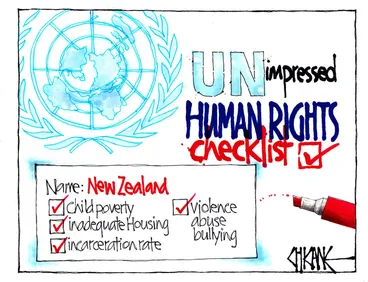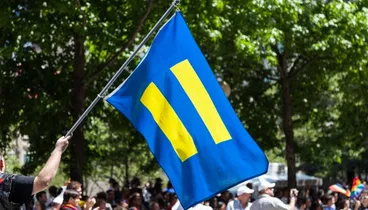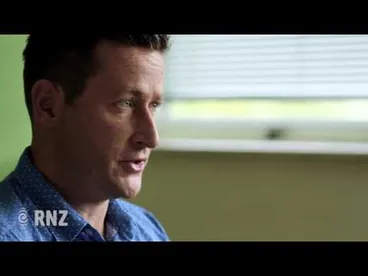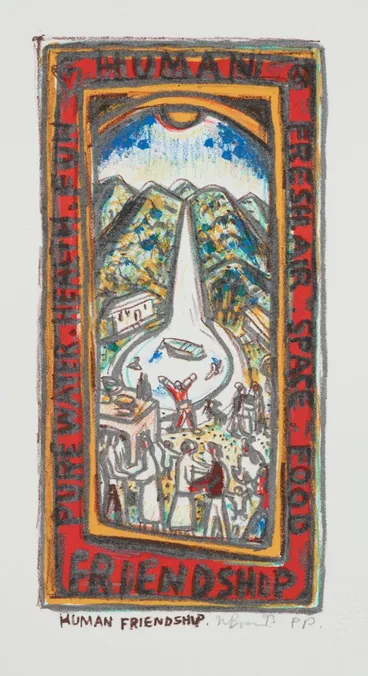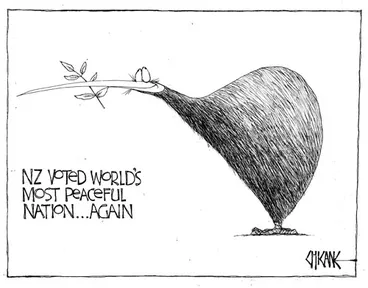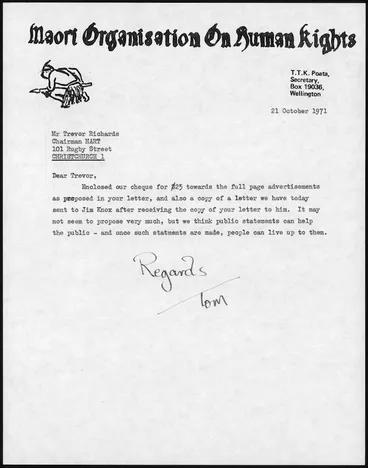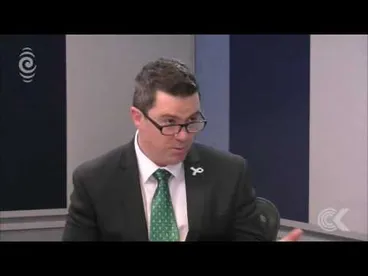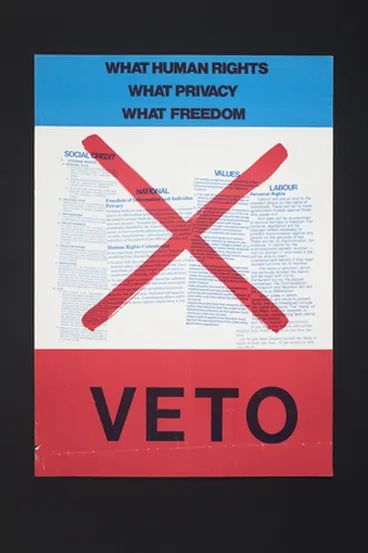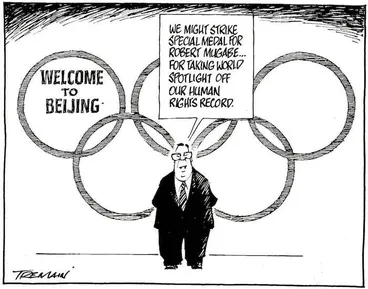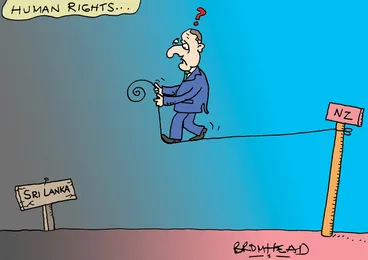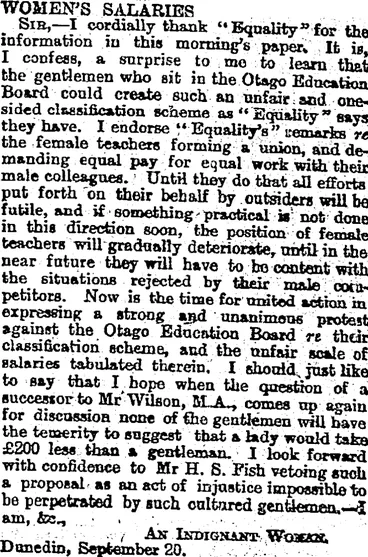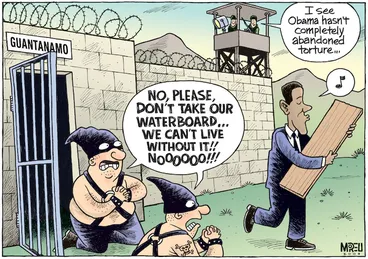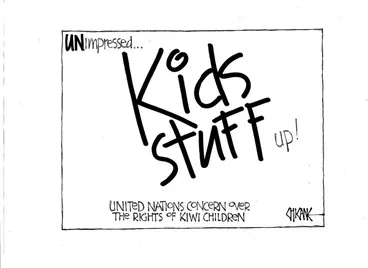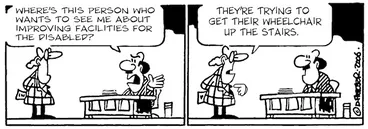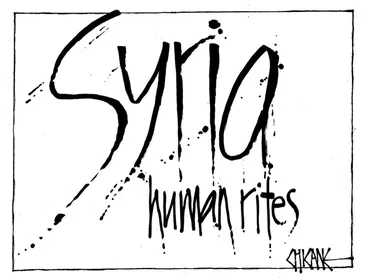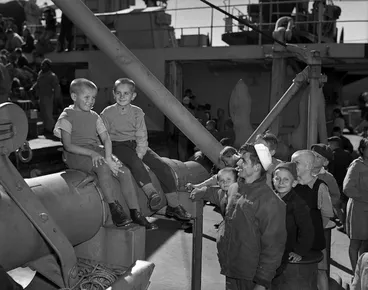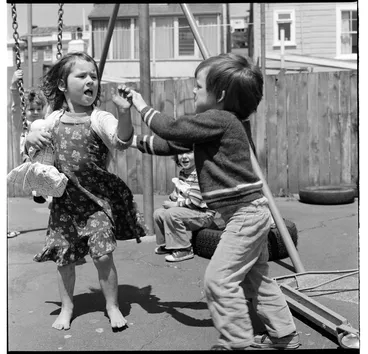Images on human rights
DigitalNZ
Human rights
National Library of New Zealand
Your New Zealand human rights
Services to Schools
Human rights: the background
Manatū Taonga, the Ministry for Culture and Heritage
Human rights for gangs
Radio New Zealand
Brutal seas: meet the men enslaved to catch our fish - Pt 3
Radio New Zealand
World Human Rights Day
Archives New Zealand Te Rua Mahara o te Kāwanatanga
Human friendship
Museum of New Zealand Te Papa Tongarewa
Making disability rights real
Social Investment Agency
Disability Rights in Aotearoa New Zealand - 2010 Convention Coalition Report
Social Investment Agency
The most peaceful nation?
Manatū Taonga, the Ministry for Culture and Heritage
2017 Women's March
DigitalNZ
Letter from Tom T K Poata to Trevor Richards
Alexander Turnbull Library
Human Rights Tribunal rules Fairfax cartoons 'not unlawful'
Radio New Zealand
Civil rights advocates: protection orders breach human rights
Radio New Zealand
First human trafficking conviction in NZ
Radio New Zealand
Human Rights Commission launches racism campaign
Radio New Zealand
Torture in New Zealand prisons : a briefing / editor: Ti Lamusse.
National Library of New Zealand
Te Whakapuakitanga o te Ao mō ngā Tika Tangata
Services to Schools
Debating human rights
Services to Schools
Philosophy of human rights
Services to Schools
Human rights speeches
Services to Schools
World report 2018
Services to Schools
Poems on human rights
Services to Schools
8 great heroes of human rights
Services to Schools
Why Saudi Arabia is about to judge NZ's human rights record
Services to Schools
International human rights legislation
Services to Schools
The case against human rights
Services to Schools
Human rights in 2066
Services to Schools
What are the universal human rights?
Services to Schools
Three fundamental freedoms
Services to Schools
Human rights data
Services to Schools
Know your rights
Services to Schools
Human rights
Services to Schools
The Human Rights Commission
Services to Schools
Human rights
Services to Schools
Rights are human rights' placard
Services to Schools
China’s special medal for Robert Mugabe
China was heavily criticised for human rights abuses during the preparation of the 2008 Olympic Games. The spotlight was on China until Robert Mugabe came under fire from Human Rights Watch for a campaign of violence and political turmoil during the 2008 elections in Zimbabwe. In this cartoon, Premier Wen Jiabao of China appears grateful for this shift in focus and indicates he would like to strike a special medal for Mugabe.
Alexander Turnbull Library
Human rights issues in Sri Lanka
New Zealand Prime Minister John Key does the balancing act on his way to Sri Lanka for the most controversial Commonwealth Heads of Government Meeting in 2013. India and Canada boycotted the meeting citing human rights abuse by the host nation. While climate change was to be the focus of the meeting, many heads of state and Human Rights groups expected John Key to approach the topic of human rights violations with the Sri Lankan President Rajapaksa. The Sri Lanka government was accused of not ensuring justice for victims of human rights violations during the 26-year long civil conflict between the government and the LTTE (a Tamil militant group).
Alexander Turnbull Library
Women’s salaries
An indignant woman raises the unfairness of the gender pay gap with the Otago Education Board in 1895. Women teachers were to take home £200 less than men. In 1967 the United Nations adopted the Declaration on the Elimination of Discrimination against Women. In 1972 New Zealand passed the Equal Pay Act requiring men and women doing the same work to be paid the same. In 2018 Stats NZ stated that while the gap has closed over the past 20 years, on average women are still paid around 9% less for an hour’s work than men.
National Library of New Zealand
Torture at Guantanamo Bay prison
Guantanamo Bay, a US prison for militants and suspected terrorists captured by the United States received worldwide condemnation from human rights organisations for various forms of torture, one of which was waterboarding. In 1987, the United Nations adopted the Convention against Torture and Other Cruel, Inhuman or Degrading Treatment. American President Barack Obama promised to close the prison when he came to power. In this cartoon, he is seen taking the waterboard away. His act of deprivation is seen as being inhuman and cruel to the prison guards who have used it for torture.
Alexander Turnbull Library
Concern over rights of Kiwi children
The Convention on the Rights of the Child was adopted by the United Nations in 1989 and by New Zealand in 1993. It includes civil, political, economic, social and cultural rights, and sets out in detail what every child needs to have a safe, happy and fulfilled childhood. In 2011 New Zealand representatives met with the UN to report on what was being done for children in New Zealand. While the UN was satisfied with the overall wellbeing of children and their rights, there were concerns that there was no ministry responsible for issues related to children, high child and infant mortality rates and the fact that 20% of children in New Zealand lived in poverty.
Alexander Turnbull Library
Improving facilities for the disabled
The Convention on the Rights of Persons with Disabilities was adopted by the United Nations on December 2006 and ratified by New Zealand in September 2008. This human right makes disability discrimination unlawful and promotes equal rights, equal opportunity and equal access for people with disabilities. This tongue in cheek image mocks the government’s efforts to improve facilities for the disabled in New Zealand. In 2016 the Government revised the New Zealand Disability Strategy to better support disabled people to improve their lives and achieve their potential. A milestone in this area was the New Zealand Sign Language (NZSL) Act in 2006, making NZSL an official language of New Zealand.
Alexander Turnbull Library
Syria – human rites
This image is about human rights violations in Syria since the pro-democracy protests in 2011. In the ensuing civil war, detention, torture, enforced disappearance, evacuations, killings and chemical weapons attacks were widespread. Thousands of civilians were at the receiving end of attacks and bombings by Syrian government forces and allies. The United Nations reported millions of Syrians became refugees. In 2016 the UN General Assembly began investigations into criminal proceedings against President Bashar al-Assad and his government for war crimes.
Alexander Turnbull Library
All Black – Māori protest racial discrimination
At one stage Apartheid was so predominant in South Africa that it was compulsory for visiting sports teams to be all-white only. Amidst protests, New Zealand did send a rugby team to South Africa in 1948 without Māori players. However, protests grew in volume when the Rugby Football Union proposed to send another all-white team to South Africa in 1960. This poster was put up by the New Zealand Citizen’s All Black Tour Association asking people to sign a huge petition calling for the tour to be abandoned for its racial discrimination. Even though the petition gathered 153,000 signatures, an all-white All Black team was again sent to South Africa.
Alexander Turnbull Library
Human Rights Explained
Services to Schools
A short history of human rights
Services to Schools
Universal Declaration of Human Rights
Services to Schools
NZ's human rights record
Services to Schools
A collection of posters on human rights issues
Services to Schools
The fight to vote School Journal curriculum level 4: May: 2017
Services to Schools
Human Rights in secondary school
Services to Schools
Human rights heroes
Services to Schools
Gisborne iwi on British 'collisions'
Services to Schools
1893 anti-suffrage cartoon (CC0013)
Services to Schools
Seven days: South Africa – the black future
Services to Schools
Impacts of actions from the past
Services to Schools
Nelson Mandela
Services to Schools
Human Rights, children's rights, and democracy
Services to Schools
Child poverty monitor
Services to Schools
30 Articles of human rights
Services to Schools
Human Rights
Services to Schools
Free speech vs hate speech
Services to Schools
Your rights as a child or young person
Services to Schools
Refugees
DigitalNZ
